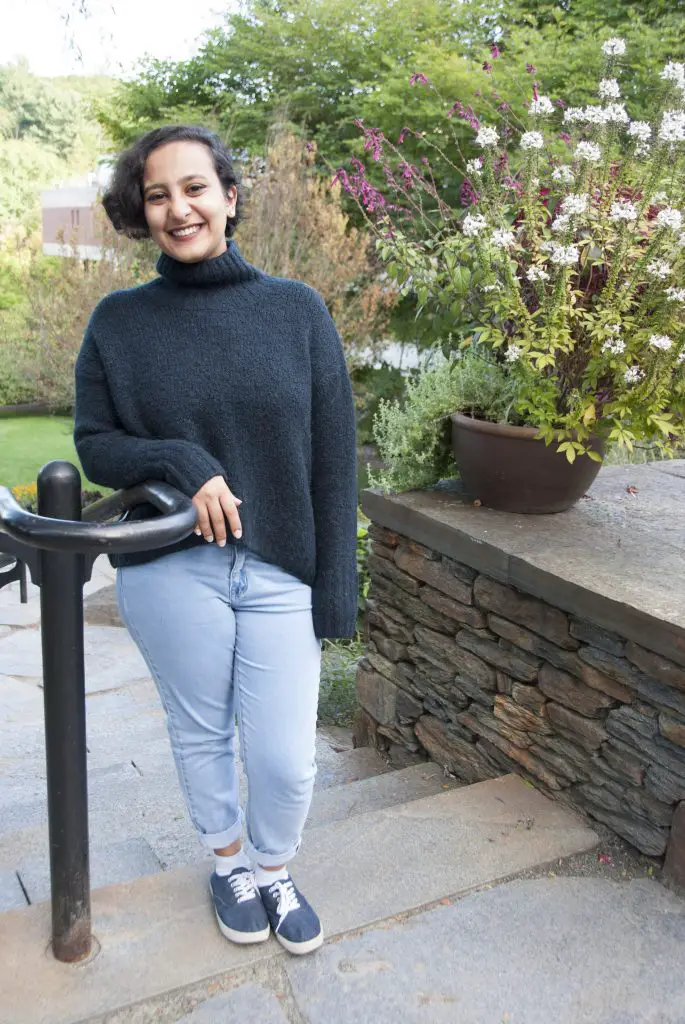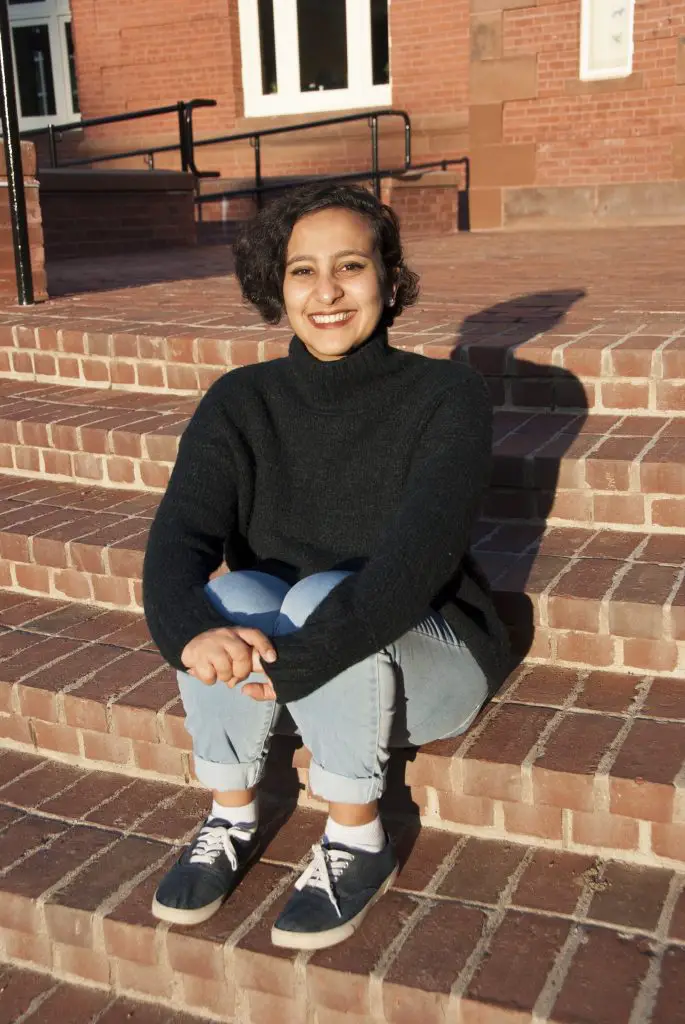The first bombing, on March 26, 2015, in the Yemeni capital Sana’a, did little to faze Nada Al-Thawr, a native of the Arabian nation who now goes to school at Mount Holyoke in western Massachusetts. “I thought [the conflict] was only temporary,” she says. “I thought it would last a week at most.”
Instead, the airstrikes, which were being dropped by a coalition of nations headed by Saudi Arabia, would continue for months, and the power struggle that became known as the one of the world’s worst humanitarian crises has continued to rage up to this day, leaving, according to moderate estimates, seventy-five hundred dead, forty-two thousand injured and 82 percent of the entire population in need of humanitarian aid.
The events that precipitated her country’s internecine conflict began six years ago, in 2011, when Yemeni President Ali Abdullah Saleh, who had been in power since 1990, refused to step down from his executive position. At the time, the Arab Spring was unfolding throughout the Middle East, and Yemeni protestors, who were inspired by the political coup the world witnessed in Tunisia, took to the streets by the thousands. On November 23, 2011, Saleh helped the country narrowly avoid civil war by signing an agreement that transferred his executive power to his vice president, Abdu Rabu Mansur Hadi. The power transfer, unfortunately, would result in a political tailspin that sent Yemen spiraling into chaos.

The new Hadi-led transitional government established the National Dialogue Conference, a set of negotiations between the country’s key political parties aimed at constructing a fairer, more accurate system of representation, in order to comply with the deal Hadi brokered with the UN and the Gulf Cooperation Council for his power. According to Al-Thawr, the National Dialogue was intended to dispel old animosities by inviting people from all parties, political affiliations and religions, as well as representatives from the old and new governments, to come together to create a better state. The hope was that diplomacy would ward off violence.
In time, Hadi’s ineffectual rule, combined with the resistance of a rebel group, called the Houthis, in northern Yemen, mired the prospects of the transitional government. As instability in the region grew, corruption and unemployment soon followed, all while Hadi attempted to deal with the Houthi insurrection. In September 2014, Houthi rebels overtook Sana’a, and by January 2015, they had ousted Hadi from power.
Up to this point, all the fighting had occurred between Yemeni groups. When it appeared that the Houthis had seized authority in the country, however, surrounding countries, especially Saudi Arabia, grew anxious about their country’s security. Nations such as Egypt, Morocco, Jordan and Sudan, amongst many others, offered soldiers and support, and first-world powers, such as the U.S., France and UK, lent logistical support in hopes of toppling the rebellion.
Soon, what had begun as an isolated political battle had deteriorated into a regional war, with the two sides viciously fighting to gain control of the country, leaving civilians like Al-Thawr caught in the crossfire.
The Forgotten Refugee Crisis
As political pundits debated the fate of Yemen, Al-Thawr’s family was living through a modern-day hell. Several weeks into the conflict, many Yemenis had already reached a breaking point. “After the bombings intensified, we he had to abandon our home,” explains Al-Thawr. “A month later, when we were staying at my grandmother’s house about thirty minutes away from my home, we heard a huge explosion coming from our town; we could feel it all the way at my grandma’s. A few days later, we saw the skeleton of what was our house.” What she had initially hoped to be a temporary conflict had soon stripped the bright twenty-year-old medical student of her family home.
Like the two million civilians displaced by the war and the one hundred eighty thousand who have fled the country, Al-Thawr knew that she would have to leave Yemen to attend school abroad. However, according to Al-Thawr, leaving the country was nearly impossible—and that was before the war began. “Most embassies shut down in Yemen in February, and the first airstrike hit the airport. With no airport, no open embassies and frozen bank assets, thousands of Yemenis were stranded on the streets, with no way home and no money.”
Even when the government finally reopened the airport to allow the stranded Yemenis to return to their home, airlines took advantage of the high demand by raising the price for flights out of the country. What was normally a $300 round trip from Yemen to Jordan became a $2,000 one-way flight, plus an additional $300 insurance fee. Still, Al-Thawr was just beginning her long journey in pursuing her education in the U.S. and had little choice but to pay the ludicrous fee. After catching the last flight available for the entire month, Al-Thawr was left with the feeling that she might be unable to return for years.
But before her journey began in earnest, Al-Thawr was met with hostility. All flights from Yemen to Jordan had to stop in Saudi Arabia for a security inspection so agents could apprehend any would-be terrorists; in reality, the shakedowns were nothing more than thinly veiled, state-sponsored extortion. “It was nasty,” Al-Thawr says. “They went through your luggage, called random names to be more thoroughly searched and if you had more than X amount of money in your pocket they made you talk to them outside.” When they landed in Jordan, the harassment continued. The airport workers made Yemenis stand in separate lines, wait for hours on end and almost lost most people’s luggage. “It was inhumane,” says Al-Thawr.
Her expatriation hit another snag when embassies across the world gave Al-Thawr the cold shoulder, refusing to accept a Yemeni application. Only Malaysia approved her entrance, so the Southeast Asian country became Al-Thawr’s safe haven as she worked to apply for a U.S. visa. While she was interviewing to enter America as a student, she found that she had one more double standard to overcome: Though a normal student visa lasts four years, most Yemenis only get a single year. Al-Thawr figured she had come too far to turn around, so she accepted the conditions of her U.S. visitation.
Arriving in Trump’s America
While Al-Thawr dealt with her personal odyssey and Yemen dealt with its societal upheaval, the U.S. was experiencing its own political turmoil. Right around the time Al-Thawr’s drawn-out exodus from the Arabian Peninsula began, halfway across the world a surprise candidate had thrown his name into the 2016 presidential race.
Donald Trump’s political platform espoused a radically isolationist stance, one that would, in effect, cut America off from the world; to realize his vision, the Republican firebrand proposed a massive wall spanning the country’s southern border and a strict travel ban on immigrants from countries that supposedly harbored terrorists. By December 2015, in response to the San Bernardino shootings, Trump doubled down and called for a “total and complete shutdown of Muslims entering the U.S.”

With one of his first orders in office, Trump proved that he was serious about curbing immigration. On January 27, 2017, the president issued an executive order initiating a ninety-day travel ban forbidding immigrants from Iraq, Syria, Iran, Libya, Somalia, Sudan and Yemen from entering the country. When she discovered that her home was included in the list, Al-Thawr was unsurprised. It takes a country only a few weeks to earn a negative reputation but years to clear its name, and her Middle Eastern home has been vilified by many first-world nations.
Still, she knows the people of her country are good and regrets that the citizens of Yemen are forced to live with the consequences of actions they didn’t commit. Money, too, plays a role in which countries make the no-fly list, and Yemen, as an impoverished nation, lacks the cache its wealthier neighbors are afforded by their oil reserves. As if to prove her point, the six countries on the travel ban are a collection of the poorest nations in the world, while rich countries, such as Saudi Arabia and the United Arab Emirates, two nations that birthed the majority of the 9/11 hijackers, were excluded.
Even though the travel ban has since been ruled unconstitutional, Al-Thawr has witnessed its emotional impact. In her eyes, not only does the ban encourage the misconception that Yemenis are a threat, but it has prevented peace in her own country. “The [travel] ban is helping to justify what is happening,” she says. “When you treat us like terrorists, it makes Yemenis feel less human. If people think the war in Yemen is just about getting rid of terrorists, then it makes it okay in a way.”
In an atmosphere of political turmoil and xenophobia, especially one heightened by the rise of domestic terrorists, such as the alt-right, Mount Holyoke, a small liberal arts school in western Massachusetts, feels like the perfect shelter for Al-Thawr. The all-women’s college has supported her in the wake of the travel ban, but they can only do so much to make her feel welcome in the country.
Despite relishing the opportunity to study in the U.S., Al-Thawr can’t help second-guessing her decision. “When you know this country is actively involved in funding [the Yemeni War], it makes me sick.” In the U.S., Al-Thawr still feels she is searching for her “right to exist.”
Reasons to Believe
Studying in the U.S. has been unbearably challenging to say the least. Trying to just be a normal student, striving for academic achievements like the rest of her classmates, is an unrealistic goal. What’s more, Al-Thawr feels a sense of guilt for living in relative safety as a student, while her family is still living through the hellish reality of civil war.
Instead of being overwhelmed by the magnitude of the problem or settling into victimhood, Nada Al-Thawr has worked tirelessly in just one short semester to bring the plight of her country to the attention of her classmates and others outside her school. In response to the political upheaval in Yemen, Al-Thawr knew that her country would need a new generation equipped to lead in the near future. As a result, she switched from studying medicine to majoring in International Relations and Computer Science, and she plans to be a part of the political process when it comes time to rebuild her country. The Mount Holyoke student is not alone in her decision either, as she said that dozens of expatriate students have changed their majors to subjects such as Political Science, Writing, Sociology and Political Law in order to better serve Yemen in the future. “People have to be held accountable for what happened,” Al-Thawr says.
“When you treat us like terrorists, it makes Yemenis feel less human. If people don’t learn about what’s actually happening in Yemen and fall into the misconception that the Yemeni is a civil war or a sectarian war, it distracts from the humanitarian crisis, the pain, the death that’s happening in Yemen everyday.”
Using her position as a college student, Al-Thawr has constructed a platform from which she can press the Yemeni issue onto the hearts and minds of everyday Americans. To do so, she organized an event on campus called “Bringing Yemen to the Table.” At the event, a guest speaker, Nadwa Al-Dawsari, a prominent Yemeni activist and researcher and Al-Thawr’s long-time family friend, discussed her recent research, which included the testimonials of over one hundred sixty Yemeni civilians’ experience with the war. The protracted bloodbath, as she saw it, was “a manifestation of the power struggle among the political elite.”
Al-Thawr also worked with Jon Western, the dean of faculty, to develop the course and curriculum for an independent study called “Exploring the War Through the Eyes of Yemeni Women,” and started an initiative called “Women of Yemen.” The former soon became a full-fledged course, which Al-Thawr enrolled in, and the latter became a website called www.womenofyemen.org, where the Mount Holyoke junior collects stories of Yemeni women as a way to share the collective voice of the Yemeni people, particularly the women, involved in the struggle.
Despite the bloodshed, widespread displacement, daunting power vacuum and xenophobia she witnessed, Al-Thawr still has a sense of hope in her heart for her home. She doesn’t place faith in the leaders that drove her country into political instability, nor does she think the humanitarian crisis will just figure itself out; instead, she places hope in the Yemeni people. “They’re so driven and passionate,” she says. “Yemenis all across the world are working day and night to help rebuild Yemen. That gives me hope.”

















